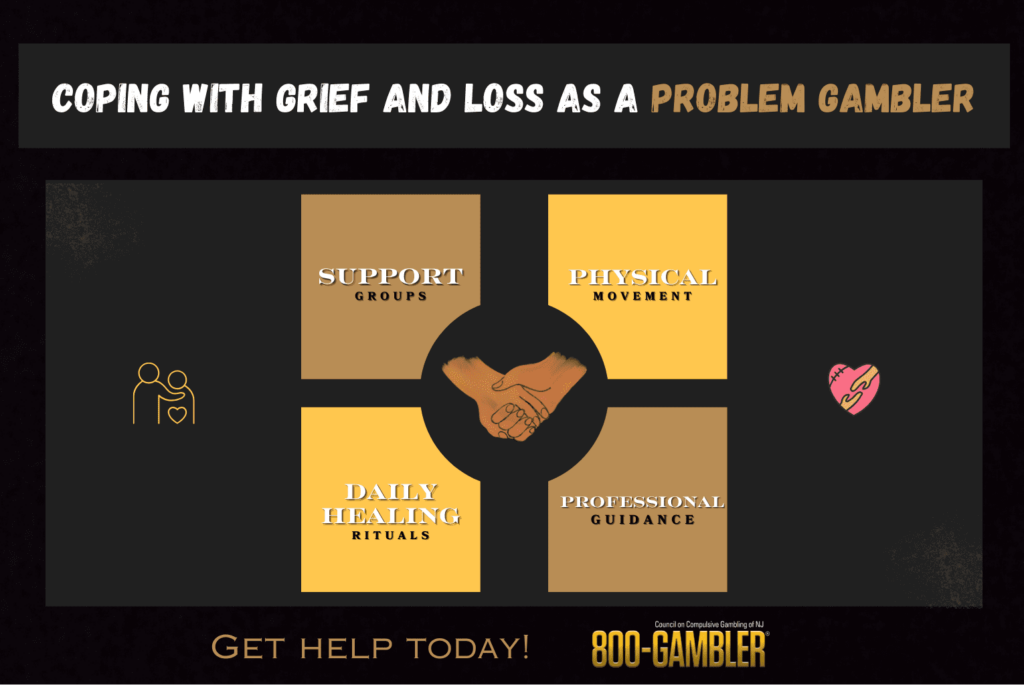Life has a way of kicking us when we’re down. Maybe you lost your job right when bills were piling up. Perhaps a relationship ended just as you were finding your footing. Or you might have experienced the loss of a loved one during your recovery journey. These moments can feel crushing, especially when you’re working hard to build a healthier relationship with gambling.
For problem gamblers, grief and loss bring overwhelming emotions that can leave you stressed and filled with anxiety. But there are ways to find comfort and build confidence while staying committed to your recovery. These helpful approaches can support you through these challenging times.

Finding Strength in Support Groups
The grieving process hits everyone differently, but you don’t have to face it alone. Support groups offer a unique space where family members and others in recovery truly get what you’re going through. These groups become a lifeline when complicated grief feels too heavy to carry by yourself.
In these spaces, you’ll meet people who know exactly how grief can trigger gambling problems. They’ve walked similar paths and found ways to cope without turning to gambling. Their stories and experiences remind us that what you’re feeling is a natural response to loss.
Sharing your story in a group setting helps normalize your feelings and reduces isolation. You might even discover new coping strategies from others who’ve successfully managed their grief while maintaining their recovery.
The Power of Professional Guidance
Working with a counselor or therapist gives you valuable tools to process anticipatory grief and current losses. They can help you untangle complex emotions that feel overwhelming and guide you toward healing without compromising your recovery progress.
Professional help becomes especially important when grief starts affecting your sleep patterns or making you feel guilty about your past gambling. A skilled counselor can show you there’s no right or wrong way to grieve while helping you stay focused on your path forward.
Remember, seeking help isn’t a sign of weakness but a smart strategy for protecting your recovery. Counselors can teach you techniques to handle moments when memories of a big win try to pull you back into old habits.
Creating Daily Healing Rituals
Building simple, daily practices can anchor you during times of sadness and anger. Start your morning with gentle stretching or meditation to center yourself. Take evening walks to process your emotions and get enough sleep. These small acts create structure when grief makes everything feel chaotic.
Your ritual might include writing in a journal, calling a supportive friend, or spending time in nature. The key is finding activities that honor your relationship with the person or situation you’ve lost while supporting your recovery journey.
These practices help manage depression symptoms while giving you better outlets for processing grief. They become reliable companions when changing jobs or other life transitions add extra stress to your plate.
Embracing Physical Movement
Exercise keeps your body healthy and acts as a powerful tool for processing the pain of grief. Physical activity releases natural mood boosters that help lift the fog of depression and give you a sense of accomplishment.
Whether it’s joining a gym class, taking up hiking, or simply walking around your neighborhood, movement creates positive feelings that counter gambling urges. The natural energy boost helps you stay focused on recovery while working through difficult emotions.
Plus, exercise can become a great replacement for the excitement you once found in gambling. It gives you measurable progress to celebrate and helps regulate sleep patterns often disrupted by grief.
Learning to Sit with Difficult Emotions
One of the hardest parts of grief is facing uncomfortable feelings without trying to escape them. In recovery, you’re already practicing this skill. Now you can apply it to processing loss.
Give yourself permission to feel anger, confusion, and sadness without judgment. These are normal reactions to loss. When emotions surge, try breathing exercises or grounding techniques instead of seeking relief through gambling.
Remember that grief comes in waves. Some days will feel lighter than others. This understanding helps prevent normal setbacks from becoming major obstacles to your recovery.
Building Your Recovery Together With 800-GAMBLER
At the end of the day, grief and loss are part of life’s journey, but they don’t have to derail your progress or alter your goals. You can work through grief while strengthening your recovery, especially with support from family, friends, and resources like 800-GAMBLER.
Our 24/7 confidential helpline is always here for you — just call 1-800-GAMBLER whenever you need to. We offer responsible gambling tips and practical support for gamblers, including tools like Betblocker, a free app that can keep problem gambling out of sight and out of mind.
You’re not alone in this journey. Every step forward, no matter how small, matters. Reach out anytime because we’re here to help you build a stronger future.
March is Problem Gambling Awareness Month, a very important time to shine a light on the impact of problem gambling and the resources available. If you or someone you love is in need, now is the perfect time to raise awareness and get the right support.



